Opinion on North Korea
Tensions continue to rise on the Korean Peninsula in the wake of the sinking of the South Korean naval vessel ROKS Cheonan by a North Korean torpedo on March 26, 2010 with the loss of the lives of 46 South Korean sailors. When the attack, presumably by a North Korean miniature submarine, occurred, the South Korean vessel was not, apparently, in disputed waters as has been reported by some news media but in South Korean waters. The attack was unprovoked.
The latest ratcheting comes in the form of the North Koreans rejecting an agreement that has been in place for some time to prevent accidental naval clashes with the South and a report from the United Nations that, surprising to no one, North Korea has been trading missile and nuclear technology to Iran, Syria, and Burma in defiance of a UN ban.
I’d like to draw your attention to a couple of analysis and opinion pieces on the situation. In the first at The Moderate Voice Jerry Remmers presents what to my eye is a pretty good report on the situation and the positions in which the various players—North Korea, South Korea, China, Japan, and the U. S.—find themselves. He concludes:
It boils down to this: Does Wen Jiaboa and Beijing believe Clinton’s assertion that the U.S. is “resolute” in backing South Korea means the U.S. going to war if the situation escalates that far? Stay tuned.
In the second Steve Green of Pajamas Media reflects on the good, the bad, and the ugly in the situation in his characteristically sardonic fashion:
The good news: It’s unlikely that North Korea has enough gasoline to fight for more than a few days.
The bad news: they could really mess up the South in less time than that.
The worse news: nobody knows what would happen after the inevitable North Korean collapse, but everybody knows that nobody could afford it.
The downright scary news: even a wildly unspectacular North Korean invasion would serve as a test of our CINC’s mettle — a test we can’t be certain he’d pass.
This morning the New York Times editorializes on importance of China in the situation:
There is only one country with any chance of getting through to North Korea. That is China, the North’s major supplier of aid, food and oil. As tensions on the Korean Peninsula continue to spiral — frighteningly — upward, China is refusing to get involved.
China has only one concern: avoiding any crisis that might unleash huge refugee flows. If it believes that the status quo is conducive to stability, it is mistaken.
That is factually incorrect. China’s interests in North Korea are broader than that in several notable ways. First, the reunification of Korea is anathema to the Chinese. It presents the prospect of a U. S. ally on their border.
It would be a setback in their assertion of themselves as the East Asian regional superpower.
Over the period of the last fifty years China has devoted substantial time, energy, and resources to North Korea. The collapse of the regime there would be embarrassing to the Chinese leadership. That’s not a trivial concern to them. It would put their reputation as shrewd, pragmatic operators at stake.
The crisis on the Korean peninsula is already producing adverse consequences for the Chinese. Japan’s Prime Minister has broken his campaign promise, reversed course, and signed on to a plan to maintain 25,000 U. S. troops on Okinawa. Indeed, he’s dismissed one of his subordinates over the matter. As the situation in Korea worsens, the Marines look that much better.
China’s interests in North Korea go beyond preventing a flood of refugees. Their plans for their own neighborhood and their standing in the world are at stake, too.
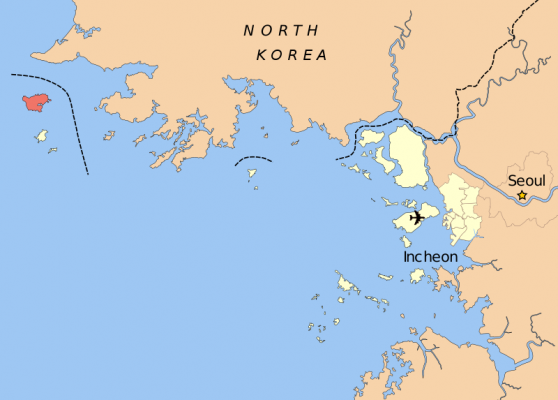

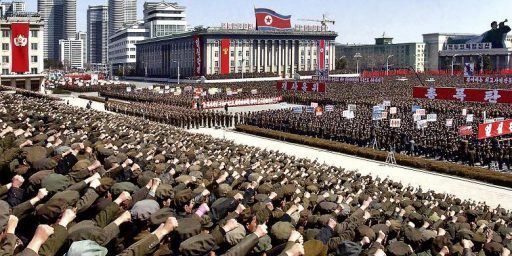
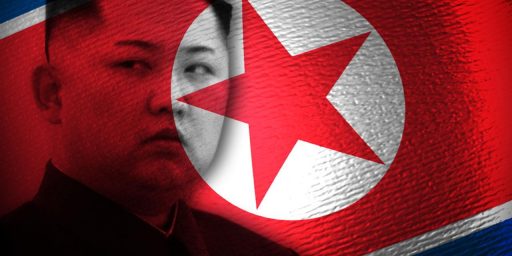
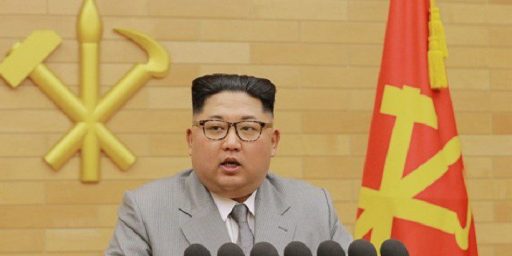

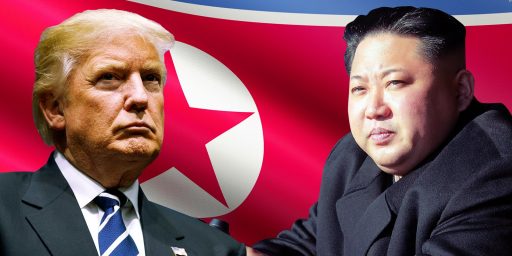
That’s right. And it’s a legitimate concern from their point of view. which is why we should be working (and may be) on the diplomacy of reassuring the Chinese on this score.
While I agree broadly with you on this, Michael, I’m not certain there is any way to reassure the Chinese on this matter. I think they see it, correctly, as a zero-sum game.
Mind you, I think the only stable solution for the Peninsula runs through reunification. Anything else is just trying to maintain an already untenable status quo.
You’d think someone in the N. Korean accession would be open to Chinese style merchant-communism. That would (a) make that person and his family very, very, rich, and (b) be more acceptable to anyone internationally than the status quo.
Would reunification create a non-Chinese Taiwan right on the border or would it be more like Viet Nam? Where would the the “flood of refugees” go? It would seem to me they would head south, not north. Would it not be an advantage to both the U.S. and China not to have North Korea supplying the Mideast with nuclear technology? Finally, is there any thought to what would happen if a coup removes the faction which is practicing this brinksmanship and begins a reunification project?
The Chinese already have had a refugee problem from North Korea for some time so it would appear their concerns are reasonable in that regard. Let’s put it this way. The per capita GDP in China is about $6,600. The per capita GDP in North Korea is $1,600. That’s roughly the same as the difference between the United States and Mexico.
Who knows what shape events would take in the event of a North Korean collapse? What we might say with greatest confidence is that it wouldn’t be under anybody’s control and the Chinese leadership is not fond of things they can’t control Particularly on or within their own borders.
IMO a coup with a goal of reunification in North Korea is so unlikely as to be not worth considering. A couple would more than likely be with the intent of supplanting the Kim family rather than that.
Perhaps the citizens right near the border, but most of Pyongyang and the rest of North Korea, not so much. I remember a few reports coming out (I don’t have the energy to find them) that, through interviews with North Korean refugees, explored the pyschological conditioning that happens in NK. If I understand correctly, most citizens–especially those removed from the border–believe that SK is a demon state whose citizens feel nothing but hatred towards the North. China, on the other hand, gives the NK citizens food and oil. Betting odds are they go towards the benevolent neighbor to the north rather than the demon state to the south.
The Chinese of course know reunification is the only long-term stable outcome. If we can find the way to reassure them that this is not a danger to them they might conclude that working toward that end is a better option than cringing every time Kim does something crazy.
Reunification need not necessarily mean SK/US troops in the north. We could offer a demilitarized north under UN mandate. China’s on the Security Council, they would be in a position to veto any change in that mandate.
The flood of refugees becomes far less likely if we and the Chinese and the UN plan for the eventuality. Given the non-existent road system running from China or SK into NK obviously moving in food will be an unholy mess. But it would be less of a mess if we have some framework in place, including a deal for cost-sharing, and a deal for reducing US military presence.
I’m not so sure that they do. The leadership tends to think in long terms. Remember Mao’s famous quip about the French Revolution? That they don’t seem to be preparing for reunification suggests to me that they don’t believe it’s something they need to worry about which in turn means they don’t think it will happen for the foreseeable future.
If you start with the premise that we are not dealing with a rational actor that may behave in a way that seems to be against its own interest to all the other rational actors, it seem the best you can do is prepare for the worst.